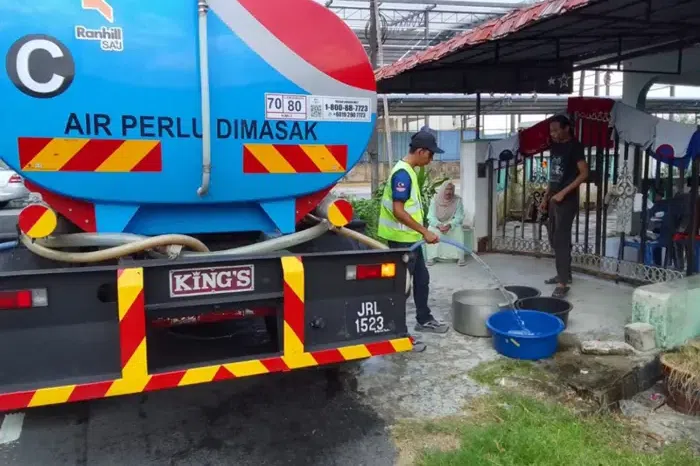PUB resumes operations at Johor River Waterworks one day after water pollution halted supply
Sign up now: Get insights on the biggest stories in Malaysia

Johor residents polled by Malaysian news agency Bernama expressed concern after hundreds of fish were found dead because of the muddy water in the river.
PHOTO: BERNAMA
JOHOR BAHRU – Singapore’s national water agency PUB resumed operations at Johor River Waterworks at noon on Nov 2, a day after a number of Johor treatment plants halted supply due to raw water pollution
The move by PUB to resume operations came after checks were carried out to confirm that water quality in the Johor River had returned to normal levels.
In a statement on Nov 2, PUB said: “Water supply from Johor River Waterworks resumed from 5.30pm today.”
On the same day, the Johor Department of Environment (DOE) said that the company linked to the river may face prosecution if it finds violations under the Environmental Quality Act.
After a meeting with the Land and Mines Office and the National Water Services Commission (SPAN), the DOE said it will initiate legal action under the relevant Land and Mines (Licencing) Enactment and the SPAN Act, reported Malaysian news agency Bernama.
The DOE also demanded a detailed report from the company on corrective actions taken to repair the breached silt pond embankment that contributed to the pollution. The company has also been instructed to monitor all operational silt ponds to ensure no further pollution incidents occur.
However, the department said that the company’s sand extraction activity was not subject to an Environmental Impact Assessment as the affected area was less than 20ha.
Once the necessary repairs are completed, the department will ensure that no additional pollutants or muddy water enters nearby river systems.
Earlier, Johor’s sole water operator Ranhill SAJ said 81 per cent of the disrupted supply was restored as at 8am on Nov 2.
Ranhill SAJ, in a Facebook statement on Nov 2, said: “Water cuts in Senai, Seelong and Bukit Indah, as well as parts of Kota Tinggi and Pontian, have resumed.
“In Kulai, 85 per cent of supply has recovered, followed by 75 per cent in Kempas and Tebrau, 64 per cent in Skudai, 49 per cent in Gelang Patah and 40 per cent along the Pontian Skudai road.”
More than 800,000 people were affected after several water treatment plants halted operations due to pollution in the Johor River.
Ranhill SAJ said on Nov 1: “Efforts to provide water through tanker trucks are ongoing to ensure consumers continue to receive supply throughout the incident that occurred on Oct 31.
“Consumers who are still receiving water supply are advised to store sufficient water.”
Ranhill SAJ said the public can obtain updates through its official complaint channel on 1800-88-7474.
Earlier reports said raw water turbidity in the Johor River surged after the sixth washing pond burst at an inland sand mining site in Kota Tinggi.

The state’s sole water operator, Ranhill SAJ, said 81 per cent of the disrupted supply has been restored as at 8am on Nov 2.
PHOTO: THE STAR/ASIA NEWS NETWORK
Johor works, transport, infrastructure and communications committee chairman Mohamad Fazli Mohamad Salleh said monitoring by several agencies had detected a significant spike.
He said water turbidity rose to 37,400 nephelometric turbidity units (NTU) compared with the normal level of around 400 NTU.
Water turbidity is the measure of water’s cloudiness caused by suspended particles like silt, clay, organic matter and microorganisms. Higher turbidity means the water is murkier while low turbidity means it is clearer.
“The incident was caused by land-based sand mining when the sixth washing pond burst due to soil movement,” he said.
“As an immediate measure, water release from the Linggiu Dam has been increased to dilute contamination in the Johor River,” Mr Fazli added.
The incident affected operations at Linggiu, Semangar, Sungai Johor and PUB’s water treatment plants. Supply was disrupted in parts of Kota Tinggi, Johor Bahru, Pontian and Kulai.
“The affected areas include parts of Senai, Skudai, Seelong, Felda Linggiu, Petri Jaya and Lima Kedai,” he said.
Singapore is allowed to draw up to 250 million gallons of water a day from the Johor River under the 1962 Water Agreement. The agreement will expire in 2061.
In return, Singapore is obliged to provide Johor with treated water – up to 2 per cent of the water the Republic imports. THE STAR/ASIA NEWS NETWORK
Additional reporting by Rhea Yasmine


